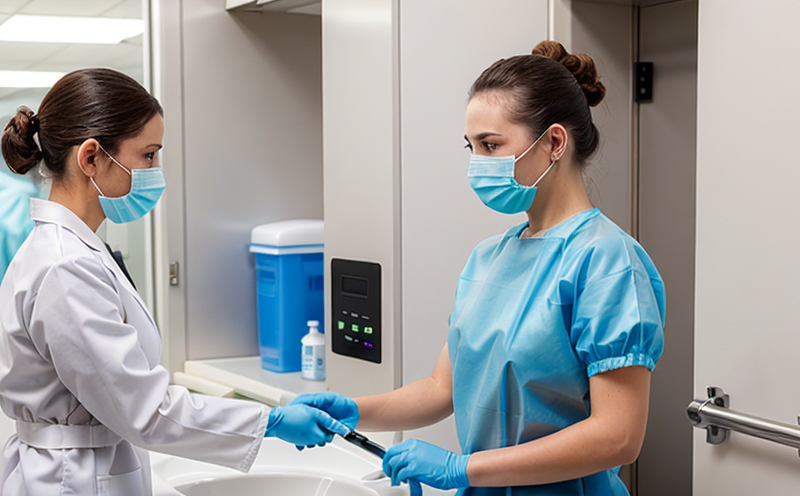JIS L1902 Testing for antibacterial activity and efficacy on textile products
The Japanese Industrial Standard (JIS) L1902 specifies a method to determine the antibacterial activity and efficacy of textiles. This standard is particularly relevant for industries that produce fabric-based items intended to have antimicrobial properties, such as medical garments, hygiene products, and personal protective equipment.
This test measures the reduction in bacterial count on textile samples after exposure to an antibacterial agent. The procedure involves inoculating a known quantity of bacteria onto the sample and then subjecting it to the specified treatment process. Afterward, the residual bacterial population is analyzed both before and after the treatment period to assess the efficacy of the antimicrobial compound.
The JIS L1902 test is crucial for ensuring that textile products meet regulatory requirements and consumer expectations regarding hygiene and safety. It helps manufacturers validate the performance claims made on their labels, thereby protecting brand reputation and customer trust.
Testing according to this standard ensures consistency across different batches of fabric and guarantees that the antimicrobial properties are effective under various environmental conditions. This is particularly important for products that will be used in demanding environments such as hospitals or sports facilities.
The test procedure requires careful preparation of the textile samples, ensuring they accurately represent the product's final form. Specimen preparation typically includes cutting the fabric into standard sizes and shapes to ensure uniformity across all samples being tested. The specimens are then inoculated with a standardized bacterial suspension under controlled conditions.
Once the treatment process has been applied, the samples undergo incubation periods appropriate for the bacteria used in the test. Following this period, the bacterial colonies on each sample are counted using microscopic techniques or other suitable methods. The results provide quantitative data indicating the effectiveness of the antimicrobial agent.
The acceptance criteria for JIS L1902 testing specify that a minimum reduction in bacterial count is required to pass the test. This threshold ensures that only products with proven antibacterial activity are approved, maintaining high standards of hygiene and protection against microbial contamination.
In practice, this method can be adapted for various types of textiles, including woven fabrics, knitted garments, and non-woven materials used in medical applications. The versatility of the JIS L1902 standard allows it to be applied across multiple sectors where fabric integrity and hygiene are critical considerations.
Understanding the nuances of this test is essential for quality managers, compliance officers, R&D engineers, and procurement professionals involved in developing or sourcing antimicrobial textiles. By adhering strictly to JIS L1902 guidelines, these stakeholders can ensure that their products meet rigorous international standards, enhancing product safety and performance.
Industry Applications
- Hospital textiles
- Caregiver wearables
- Medical garments
- Hygiene and sanitation products
- Sportswear and athletic apparel
- Textiles for public facilities
The JIS L1902 standard finds extensive application across multiple sectors, particularly those where hygiene and safety are paramount. Hospitals, for instance, use textiles that must maintain high levels of antibacterial activity to prevent the spread of infections. Similarly, caregiver wearables need to be durable yet effective in reducing pathogens on contact surfaces.
In the realm of medical garments, ensuring that fabric maintains its antimicrobial properties is crucial for patient and staff safety. Hygiene and sanitation products, such as wipes or cleaning cloths, benefit greatly from consistent antibacterial performance to meet consumer expectations. Sportswear manufacturers also rely on this standard to enhance product longevity while maintaining hygiene standards.
Public facilities like schools, gyms, and office buildings use textiles that undergo JIS L1902 testing to ensure they remain hygienic under frequent usage and exposure to various environmental conditions. By leveraging the insights from these tests, manufacturers can develop products tailored to meet specific sector needs effectively.
Eurolab Advantages
Eurolab offers comprehensive JIS L1902 testing services with a focus on delivering accurate and reliable results. Our team of experts ensures that every sample is prepared and tested according to the strictest international standards, guaranteeing consistency and repeatability.
We employ advanced instrumentation and techniques to measure bacterial reduction accurately, providing clients with detailed reports that are backed by scientific data. This level of precision helps our customers make informed decisions regarding product development and compliance with regulatory requirements.
Our facilities are equipped with state-of-the-art laboratories, enabling us to conduct a wide range of tests beyond JIS L1902. This holistic approach allows Eurolab to offer clients a complete package of services that enhance their competitive edge in the market.
The expertise and experience of our team set Eurolab apart from other testing facilities. We stay updated with the latest developments in textile science, ensuring that we can provide accurate interpretations and recommendations based on current research findings.





